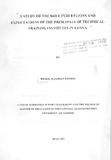| dc.description.abstract | The purpose of this study was to compare the role perceptions of the principals of technical training institutes in Kenya, to the expectations of the technical training officers/inspectors and teachers working with them. The study further investigated the relationship between educational/training background and teaching experience to the role perceptions of the respondents.
A sample of one hundred and fifty one teachers and nine principals from technical training institutes spread around the country, responded to the 'role perception inventory'. In addition, eleven technical training officers/inspectors also responded to the role inventory and the data so collected analysed. The first part of the inventory collected personal data of the respondents. The main part of the inventory consisting of 16 items, was designed to measure four dimensions of the role of the principal.
They consist-
i) the status dimension which measures the desire for success versus the desire for equality.
ii) the authority dimension which is characterised by the desire for independence versus the
desire to be dependant upon others in decision making.
iii) the institutional dimension which casts friendship obligations against institutional obligations, and
iv) the means end dimensions which measures the desire to get immediate practical job done versus the desire for the process of achievement.
Analysis of variance (ANOVA) at 0.05 level of significance was computed to determine the difference in role expectations between the principals, training officers/inspectors and teachers. To determine the difference in role expectations between university graduates and non graduates, technically trained and those without technical training, experienced (withfive years and above of teaching) and the inexperienced, t-test for independent means at 0.05 level of significance was used.
Main findings of this study indicated that there was no significant difference in perceptions or expectations between the principals, technical training officers/inspectors and teachers regarding the combined four role dimensions of the principal. Academic qualifications was found not to be a major factor influencing the expectations of respondents on the combined four role dimensions of the principal. However, technical training and teaching experience were found to be contributing factors on the expectations of the respondents on the combined four role dimensions of the principal.
Based on these findings , it was recommended that all those who work closely with the principal in the management of institutes need to be oriented on the role of the principal in the institute. It was further recommended that to be appointed a principal, one should have served as a teacher for at least five years and that he needs to have training in both technical training as well as educational administration. | en |

